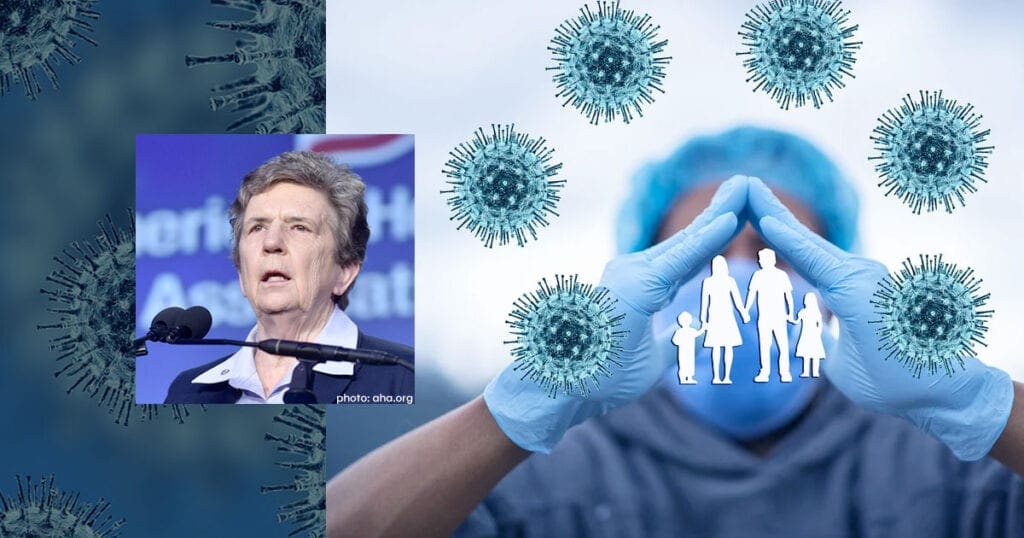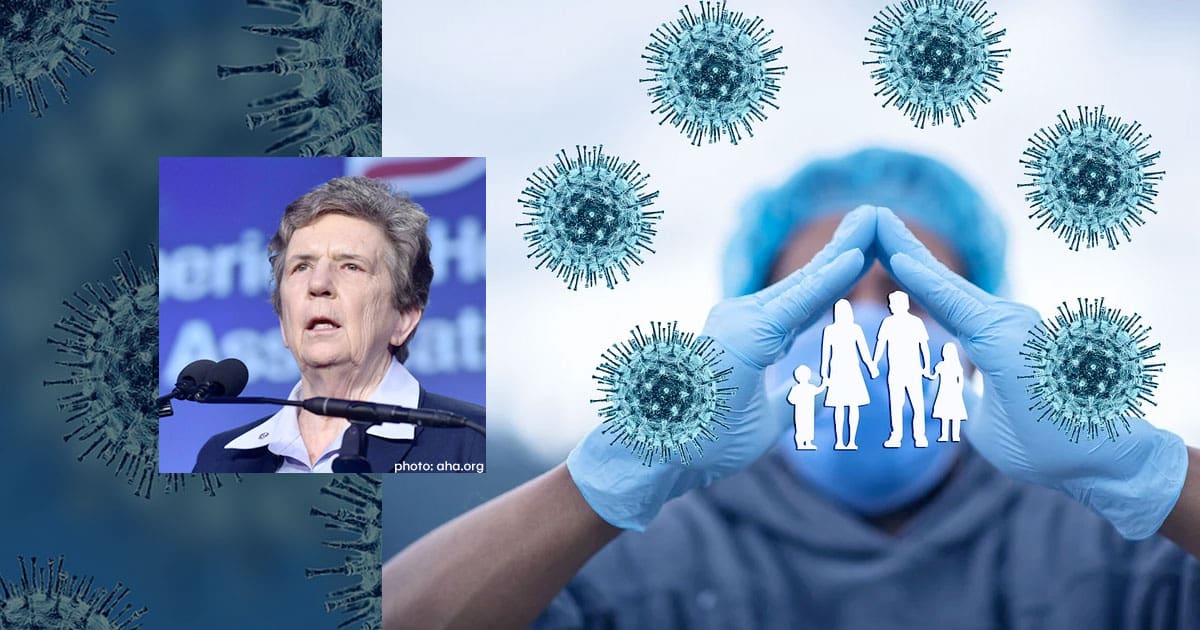How the pandemic could reshape the U.S. health care system
It is clear that the spread of the new coronavirus and its impact on the world have been a real and unprecedented game changer. In the United States, we have faced the vulnerability of our physical health, economy, lifestyle and status as a nation on the world stage. We have seen with profound clarity how invaluable and irreplaceable hospitals are. Even as many services formerly associated only with hospitals are now carried out in so many other settings, it has become clear that there are critical services, like caring for the seriously ill on a large scale, that only hospitals can provide.

As the president and chief executive officer of the Catholic Health Association for 14 years, I advocated for just health care policy and reform. And my years as a nurse and in hospital management allowed me to see up close how important it is to have well-run hospitals with competent and dedicated staff. Today, all of us have seen the real vulnerabilities in our current system.
We have seen the impact that the health of the entire nation has on our individual health in very clear and urgent ways. We have seen the increased vulnerability of those who are poor and of people of color. We have seen heightened vulnerability among workers in our medical facilities and in other essential services like grocery stores, pharmacies and meatpacking plants. We have seen the vulnerability of the health of our fellow shoppers. The well-being of each of these groups is important to them and should be important to all of us simply because we are called to care for one another as brothers and sisters in Christ. But we also now better understand the ways in which the health of each person around us can affect our own lives.
We have seen again the lunacy of our health care financing system, so piecemeal, so dependent on employment. Over 30 million Americans lost their jobs in six weeks, which means their health care coverage was most fragile when they needed it the most. Losing one’s job is stressful enough, as families struggle to cover housing and food expenses on an unemployment check. But in a crisis of this scale, no unemployment office, Medicaid office or Affordable Care Act enrollment program can effectively respond in a timely manner, leaving people waiting for payments and stuck in a stressful sort of limbo.
We have seen the importance of establishing and appropriately funding national agencies like the Centers for Disease Control and Prevention, the Federal Emergency Management Agency and the U.S. Food and Drug Administration—all so important to effectively managing our response to public health emergencies. This is especially true when it comes to preparing for needs like widespread testing, stockpiling of essential equipment and supplies and providing public health guidance on a national scale.
We have seen how important collaboration is between the public and private sectors, between the states and the federal government and among nations. We have seen how critical communication is and the importance of sharing accurate information in a timely manner. The need for transparency in communicating has been highlighted compellingly during these days of pandemic. Failures in these areas and the resulting catastrophic consequences have been on painful display.
We have also seen things that left us awestruck. The heroism of hospital staffs, first responders and other essential workers cannot be exaggerated. There is no question that they daily put their lives at risk to help save us from a disease we do not understand, for which do not have a cure and from which we do not have foolproof ways of protecting ourselves. Many struggled to balance their responsibility to do their jobs and their responsibility to protect their families. It was also painfully clear that we as a nation put these workers’ health at risk by failing to provide the necessary equipment and resources for caring for patients and protecting themselves.
We have seen so many genuine heroes, and we have been thrilled with the creativity and commitment demonstrated by our fellow citizens. We have seen millions of Americans try to protect those most vulnerable to the virus by staying home, supporting one another in this time of isolation and uncertainty, and expressing gratitude for health care and essential workers in new ways.
What Must Change
We have also become aware that we must come together as a nation to build a better health care financing system. The profound damage this pandemic has done in every area of our lives cannot be exaggerated. Its potential for continued damage—to the health of individuals, to the economy, to the health care system—causes panic in even the most sanguine among us. It demands that we be proactive in creating the “new normal.”
Our faith compels us to use our most cherished values as the touchstone for our decisions. Jesus Christ was clear: The two great commandments are to love God and to love our neighbor as ourselves. Fortunately, the founding documents of our country echo this: “All are created equal by our creator and have a right to life, liberty and the pursuit of happiness.”
There are so many areas in our world that need attention: our economy, our health care system, our struggling families, our standing in the international community and the cherished areas in the life of our country like beaches, parks, sports and entertainment. We must not use the “good old days” to set the bar for the future. The coronavirus crisis has made it even clearer that there are many areas in the provision of health care that need critical improvements in quality, cost-effectiveness, equity and justice. The era we are entering will certainly have frightening and challenging moments, but it can also be a time of innovation, greater compassion and hope.
As someone who has spent a lifetime in health care, I hope we can make good use of this opportunity. To ensure a healthy future for all Americans, we must deal with the area of health care financing and insurance. Today, it is unnecessarily complex and wasteful in many ways. It has a surprisingly wide variation in reimbursement amounts for health care providers, and these amounts are constantly changing.
Patients and providers are not well served by the current system; neither are employers or the nation’s economy. So many of our health care dollars do not go to health care. A bizarre mix of programs finances our health services. For example, Medicare provides health security for seniors in a complex and often inefficient way. The program can dictate its reimbursement to some providers, but with others it cannot even negotiate for pricing. For still others it creates negative incentives, like limiting the number of days it will pay a hospital to care for a patient with a particular condition while putting no limit on the number of days a doctor may visit the patient. Thus the doctor, who is responsible for discharging the patient, may be incentivized to continue treatment, while the hospital may be incentivized to move a patient along. Another example: Medicaid pays providers significantly less than the cost of care for patients, who are often the most needy. Insurance companies, which may pay providers real costs or more, pass those costs on to employers and employees and have developed such complex and ever-changing rules that many patients find that even with supposedly “good insurance” they incur significant personal expenses.
For decades, hospitals tried to keep open programs that were not sufficiently reimbursed by charging more for other services, especially outpatient testing, surgery and other treatments. This has allowed hospitals to keep needed community services like trauma centers, psychiatric services, maternity wards and burn centers available to their communities. It has also allowed them to care for patients who have no insurance or are enrolled in insurance programs like Medicaid that pay significantly below the cost of care. But in the post-Covid-19 world, this long outdated and utterly inadequate use of cross-subsidizing to balance the budget will no longer be enough to enable hospitals to provide high-quality care as well as just wages and benefits for their employees.
This practice reached a breaking point even before the pandemic, as other groups took more of the high-revenue products out of the hospital. Lab, radiology, cardiology, surgeries, gastroenterology and many other services that were essential to the hospital’s financial survival left in large numbers for other facilities. The pandemic increased the fragility of hospitals when they were most needed, and when the services only they could provide were needed in record numbers.
In an election year it will be imperative that those who are elected to state and federal offices be committed to dealing effectively and transparently with the issue of the provision of health care in this country. We can no longer tolerate the serious problems that result from a broken and fragmented health care financing system. We also need a renewed commitment to the public health infrastructure and methods to assure its readiness.
I am not trying to make the case for Medicare for All or taking away employer-sponsored insurance options or doing away with reasonable choices in health care insurance programs. But I am calling for innovation and for change. We are a great nation with smart and dedicated citizens. We can design a health care financing system that is uniquely ours, that focuses on the common good, on equity, and that allows a special sensitivity to the most vulnerable among us.
We cannot approach health care as we have in the past. We cannot make the necessary changes without transparency and good will and some protection against an inappropriate coercion of legislators by groups with financial interests that are at odds with public and individual health outcomes. This will take a change from the current polarized environment in Congress and the administration, and it will need the cooperation and input of all parties.
I personally believe the Affordable Care Act is a good place to start. It was always intended to be a start, to inspire further transformation. In spite of the persistent assaults on it, the A.C.A. has done much good. But much more needs to be done. Repairing the damage that has been done to this program and using it to build a more functional health care financing system that is understandable, transparent, accountable and uniquely ours is essential to our nation’s health and financial future.
Our hospitals and other providers have taken a body blow from this pandemic. Simply reopening the economy is not going to restore the fiscal health of hospitals—and fiscal health is essential to being a good health care provider. Hospitals will need well-managed fiscal assistance from the government in the short term and a national effort to improve our health care financing system in the long term.
It will take providers, employers, unions, insurers, governments and consumers working together to transform our health system into one that is worthy of our great nation. And the time to start is now.
This article also appeared in print, under the headline “The Call of the Crisis,” in the June 8, 2020, issue.
Source: American Magazine
Tags: coronavirus







0 Comments